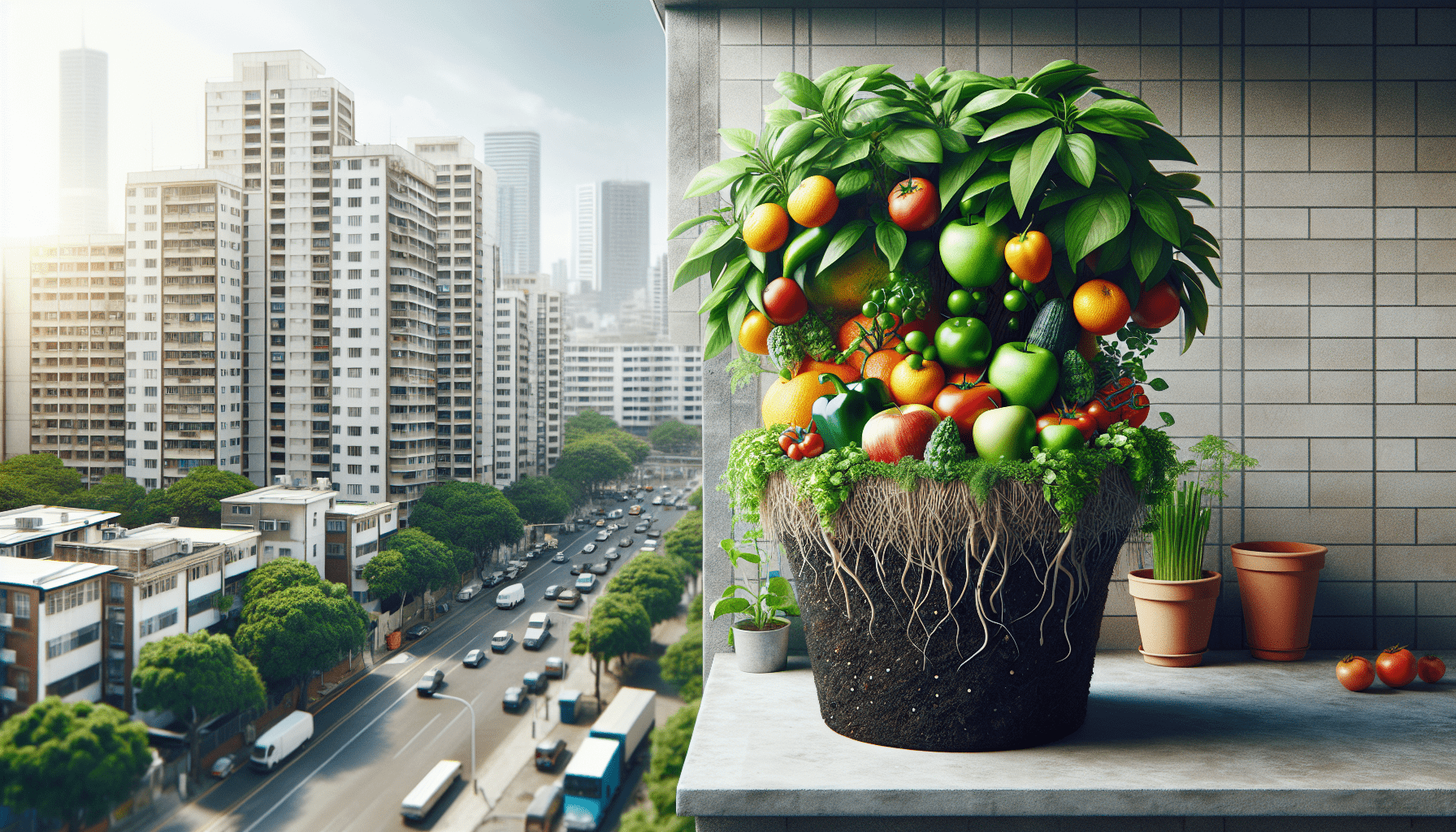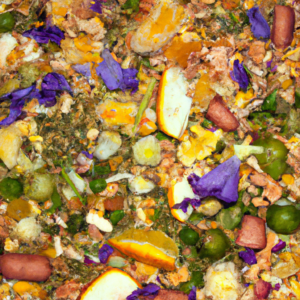Living in an apartment doesn’t mean you have to give up on the idea of composting. Many apartment dwellers think that composting is only for those with backyards or gardens, but it’s actually quite possible to compost even in a limited space. With a little creativity and some practical tips, you can turn your apartment into a mini-composting haven. In this article, we’ll explore different composting methods that are apartment-friendly and help you reduce your food waste while contributing to a greener planet.
What is composting?
Definition of composting
Composting is the natural process of decomposing organic materials into nutrient-rich soil. It involves the breaking down of food scraps, yard waste, and other organic matter into a dark, crumbly substance known as compost. This process is facilitated by microorganisms such as bacteria, fungi, and worms, which break down the materials into simpler forms that can be easily absorbed by plants.
Benefits of composting
Composting offers numerous benefits, both for the environment and for individuals. Firstly, it helps to reduce food waste, which is a significant issue globally. By composting food scraps, we can divert organic materials from landfills, where they produce harmful greenhouse gases, and instead turn them into valuable soil amendments.
Secondly, composting creates nutrient-rich soil that nourishes plants and promotes healthy growth. Compost is rich in organic matter, which enhances soil structure, water retention, and nutrient availability. Using compost in gardening and landscaping can lead to healthier plants, reduced need for chemical fertilizers, and improved overall soil health.
Lastly, composting decreases our reliance on chemical fertilizers. By enriching the soil naturally, compost reduces the need for synthetic fertilizers, which can be harmful to both the environment and human health. Using compost as a natural alternative is not only more sustainable but also helps to promote a more balanced and harmonious ecosystem.
Importance of composting
Reducing food waste
One of the key reasons why composting is important, especially for apartment dwellers, is its role in reducing food waste. Food waste is a significant issue worldwide, and composting provides an eco-friendly solution to address this problem. Instead of throwing food scraps in the trash and sending them to landfills, we can compost them and divert them from becoming a source of harmful greenhouse gas emissions.
Creating nutrient-rich soil
Composting helps create nutrient-rich soil, regardless of whether you have access to a garden or not. Even in an apartment setting, composting can be done indoors, and the resulting compost can be used for potted plants, vertical gardens, or shared community spaces. By enriching the soil with compost, we ensure that our plants receive the necessary nutrients for healthy growth, enhancing their overall health and productivity.
Decreasing reliance on chemical fertilizers
Another crucial aspect of composting is that it reduces our reliance on chemical fertilizers. Traditional fertilizers often contain synthetic chemicals that can have adverse effects on soil health, water quality, and human health. By composting, we can produce nutrient-rich soil amendments naturally, eliminating the need for these chemical fertilizers. This shift towards organic and sustainable practices benefits both the environment and our own well-being.
Challenges of composting in an apartment
While composting offers numerous benefits, apartment dwellers may face unique challenges when it comes to implementing composting systems. However, with some planning and creativity, these hurdles can be overcome. Here are some common challenges of composting in an apartment:
Limited space
One of the most significant challenges of composting in an apartment is limited space. Apartments often lack the yard or outdoor area necessary for traditional compost piles or bins. However, this should not discourage us from composting. There are several indoor composting methods specifically designed for small spaces that can effectively turn organic waste into compost without requiring much room.
Odor control
Concerns about odors are another challenge of composting in an apartment. Composting, when done properly, should not emit strong or unpleasant odors. However, in small living spaces, the smell can become an issue if there is inadequate ventilation or improper management of the composting system. Implementing odor control measures, such as using airtight containers or adding carbon-rich materials like dry leaves or newspaper, can help minimize any potential odors.
Pest control
Pests can be a concern when composting indoors. Fruit flies, small insects, or even rodents may be attracted to the decomposing organic matter. To prevent pests from becoming a problem, it is essential to maintain a proper balance in the composting system by avoiding adding meat, dairy, or oily food scraps. Additionally, regularly monitoring the compost and ensuring it remains well-maintained can help prevent pest infestations.
Lack of outdoor area
Limited access to an outdoor area presents a challenge for apartment dwellers who wish to engage in composting. However, even without access to an outdoor area, vermicomposting, bokashi composting, and compost tumblers are viable options that can be done entirely indoors or on a balcony. These methods allow for effective composting within the confines of an apartment, making it accessible to anyone, regardless of their outdoor space limitations.
Indoor composting options
Apartment dwellers have several options for composting indoors. These methods allow for effective composting in small spaces without the need for outdoor areas. Here are three popular indoor composting methods:
Vermicomposting (using worms)
Vermicomposting, also known as worm composting, is an ideal choice for apartment dwellers who want to compost indoors. This method utilizes a specialized container filled with bedding materials, organic waste, and a population of composting worms. The worms break down the organic matter, producing nutrient-rich castings, or worm compost, that can be used to fertilize plants.
Bokashi composting (using fermentation)
Bokashi composting is another viable option for apartment composting. This method relies on the process of fermentation to break down organic waste. It involves the use of a specialized container, which is airtight and equipped with a spigot for draining any excess liquid. Bokashi composting utilizes beneficial microorganisms to ferment the food waste before it is added to a traditional compost bin or buried.
Compost tumbler
Compost tumblers are compact, self-contained units that allow for effective composting without outdoor space requirements. These containers are designed to be rotated regularly, which helps to mix the organic waste and facilitate the composting process. Compost tumblers are particularly suitable for apartment composting as they control odor, provide efficient decomposition, and require minimal maintenance.
Vermicomposting
Benefits of vermicomposting
Vermicomposting offers numerous benefits for apartment dwellers. Firstly, it can be done entirely indoors, making it a convenient choice for those with limited outdoor space. Additionally, vermicomposting is a quick and efficient process, with worm castings being produced in a relatively short amount of time. The resulting worm compost is nutrient-rich and makes for an excellent organic fertilizer that promotes healthy plant growth.
Setting up a worm bin
To start vermicomposting in an apartment, a worm bin needs to be set up. The bin can be made from a plastic container or purchased commercially. The bedding materials, such as shredded newspaper or coconut coir, need to be moistened and placed in the bin. Red worms, such as Eisenia fetida or Lumbricus rubellus, are commonly used for vermicomposting and can be added to the bin along with food waste. It is essential to maintain the proper balance of carbon-rich bedding materials, food waste, and moisture levels to create an optimal environment for the worms.
Types of worms used in vermicomposting
Not all worms are suitable for vermicomposting. The two most commonly used worm species are Eisenia fetida (redworms) and Lumbricus rubellus (red wigglers). These worms are well-adapted to the composting process and thrive in the organic waste environment. It is important to source these worms from reputable suppliers to ensure their health and viability for effective vermicomposting.
Bokashi composting
Benefits of bokashi composting
Bokashi composting provides several advantages for apartment dwellers. Firstly, it allows for the composting of a wider range of food waste, including meat, dairy, and oily items, which are typically discouraged in other composting methods. The fermentation process involved in bokashi composting helps to break down these materials effectively. Additionally, bokashi composting can be done entirely indoors, making it a convenient option for those with limited outdoor space.
Process of bokashi composting
Bokashi composting involves the use of a specialized container known as a bokashi bin. To begin the process, food scraps are added to the bin and then layered with bokashi bran, a mixture of beneficial microorganisms. The bin is sealed, and the fermentation process begins. The resulting pickled waste can then be added to a traditional compost bin or buried in the soil, where it continues to decompose and enrich the soil.
Materials needed for bokashi composting
To start bokashi composting in an apartment, several materials are needed. Firstly, a bokashi bin with an airtight lid is required to create the ideal environment for fermentation. Bokashi bran, which contains beneficial microorganisms, is an essential component. Additionally, a compost bin or a designated area in the garden to transfer the fermented waste for further decomposition is necessary. Overall, bokashi composting requires minimal space and materials, making it a suitable option for apartment composting.
Compost tumbler
Benefits of using a compost tumbler
Compost tumblers offer several benefits when it comes to apartment composting. Firstly, they are compact and self-contained, making them suitable for small spaces. The tumbler design allows for easy mixing and aeration of the organic waste, promoting faster decomposition and reducing the risk of odors. Compost tumblers also minimize the need for physical labor, as the waste can be simply turned by rotating the tumbler. Additionally, they provide a neat and visually appealing composting solution for apartment dwellers.
Choosing the right compost tumbler
When selecting a compost tumbler for apartment composting, a few factors should be considered. Firstly, the size of the tumbler should be appropriate for the amount of organic waste generated and the available space. It is also essential to choose a tumbler with good insulation and a tight-fitting lid to maintain optimal composting conditions. Furthermore, a tumbler with a gear or crank mechanism for easy rotation can make the composting process more convenient.
Tips for using a compost tumbler in an apartment
To ensure successful composting with a tumbler in an apartment, there are a few tips to keep in mind. Firstly, it is crucial to maintain a proper balance of green (nitrogen-rich) and brown (carbon-rich) materials to promote efficient decomposition. Additionally, regularly turning the tumbler every few days helps to mix the composting materials and provides the necessary aeration. It is also recommended to monitor moisture levels and adjust as needed by adding water or dry materials. Lastly, being mindful of the tumbler’s capacity and not overfilling it allows for effective composting.
Alternative composting methods
While apartment dwellers may face unique challenges in composting, there are alternative methods available to overcome these hurdles. Here are some alternative composting options for apartment residents:
Community composting programs
Many cities and communities now offer community composting programs. These programs provide designated areas or facilities where residents can drop off their organic waste for composting. Participating in such programs allows apartment dwellers to contribute to composting efforts without the need for personal composting systems.
Local composting facilities
Some areas may have local composting facilities or centers that accept organic waste from residents. These facilities use industrial composting methods to process large amounts of organic waste efficiently. Apartment residents can inquire about nearby facilities and consider utilizing their services to divert their food waste from landfills and contribute to the composting process.
Donating compostables to urban farms or gardens
Apartment dwellers can also consider donating their compostable materials to urban farms or community gardens. Many urban farming initiatives gladly accept organic waste from local residents to use as compost. By donating their compostables, apartment dwellers can contribute to these sustainable agriculture projects and support local food production.
Tips for successful apartment composting
Composting in an apartment can be a rewarding and sustainable practice. To ensure successful composting, here are a few tips:
Managing food waste
Be mindful of the types and quantities of food waste being added to the compost. Avoid adding meat, dairy, and oily foods to prevent odors and pest problems. Instead, focus on fruit and vegetable scraps, coffee grounds, tea leaves, and plant trimmings. Balancing the carbon-to-nitrogen ratio by adding dry leaves or shredded paper helps maintain a healthy composting environment.
Balancing moisture and airflow
Proper moisture and airflow are essential for successful composting. The compost should be kept moist, similar to a wrung-out sponge, to support microbial activity. However, be cautious not to overwater, as excessive moisture can lead to foul odors or anaerobic conditions. Periodically turning or aerating the compost helps maintain proper airflow and promotes decomposition.
Harvesting and using compost
Knowing when the compost is ready for use is crucial. When the materials have broken down into a dark, crumbly, earthy substance, it is a sign that the compost is mature and ready to be used. Harvest the compost by removing the finished material from the bottom or sides of the composting system. Use the compost to enrich potting soil, amend garden beds, or nourish indoor plants. The nutrient-rich compost will provide plants with the essential elements for healthy growth.
Conclusion
Composting is an essential practice for apartment dwellers wishing to reduce food waste, create nutrient-rich soil, and decrease reliance on chemical fertilizers. Despite the challenges presented by limited space, odor, pests, and lack of outdoor areas, apartment composting is possible through various indoor composting options such as vermicomposting, bokashi composting, and compost tumblers. Additionally, alternative methods like community composting programs, local composting facilities, and donating compostables to urban farms or gardens offer viable solutions for apartment residents. By following the tips for successful apartment composting, we can all contribute to a more sustainable and eco-friendly future, even from the confines of our apartments. Happy composting!




